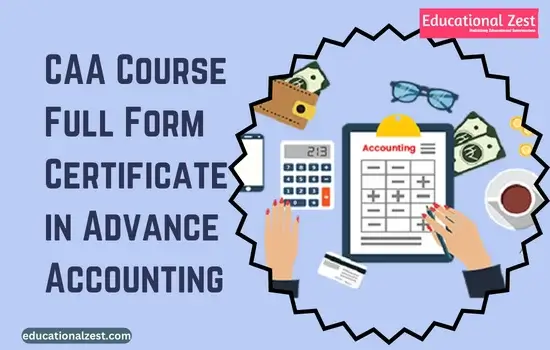The Caa Course Full Form is Certificate in Advance Accounting. In the ever-evolving landscape of finance and accounting, a Certificate in Advanced Accounting (CAA) serves as a vital stepping stone towards a rewarding career. This comprehensive 6-month to 1-year certification course, widely offered at undergraduate levels in India, equips students with the essential theoretical knowledge and practical skills required to excel in various financial roles. Let’s delve into what this course entails, its eligibility criteria, future scope, and the lucrative salary prospects it offers.
What is the Certificate in Advanced Accounting About?

Certificate in Advanced Accounting (CAA) students learn accounting fundamentals and complicated financial procedures. Its well-designed curriculum includes Advanced Accounting, Fundamentals, Taxation, Business and Commercial Laws, Banking and Finance, and more. Students study these areas to understand about financial management’s numerous aspects. Full-time and part-time students may satisfy their accounting needs and interests with the flexible program. The CAA program ensures accessibility without compromising education quality, whether students choose full-time or part-time to balance school and other obligations.
Eligibility Criteria
The CAA program requires a recognized Indian board 12th or Senior Secondary degree. Upper secondary exams are prioritized for admissions. CAA seldom requires entrance examinations, unlike other colleges. Financial and accounting skills may help you get into these top institutions, but academics are crucial. These skills boost eligibility and prepare students for the CAA program’s rigorous academics and practical applications.
Financial and accounting fundamentals are required for CAA applicants. Consider self-study, related classes or seminars, or expert aid. Finance and accounting might help you get into your dream school. A 12th or Senior Secondary degree is the minimum need for the CAA program, however elite colleges may demand outstanding academic achievement and financial and accounting skills. Academics and dedication may help applicants get in.
Future Scope
Alumni of CAA may work in numerous professions. Graduates may work in accounting, taxation, auditing, corporate finance, and banking. Depending on interests and specialization, candidates may become Accounts Assistants, Bookkeepers, Financial Analysts, or Financial Controllers.
NRHM, RBI banks, AIG, Boeing, and JP Morgan Chase actively recruit CAA graduates for INR 2-4 LPA jobs. These occupations provide financial stability and career advancement in finance and accounting. Financial ideas and practical skills are taught in the CAA program to help graduates excel in their professions and contribute to their industry.
Salary Insights
CAA graduates may expect excellent incomes in several industries. Bookkeeping Clerks average INR 2 LPA for financial and administrative assistance. Accounting software helps billing clerks bill and invoice for INR 1.5 LPA. Tax accountants manage tax structures, financial records, and files for INR 4 LPA on average. INR 3.5 LPA accounting clerks update and maintain records. Accountants who assess and evaluate manufacturing expenses make INR 3 LPA on average. These compensation data show the CAA program’s success in preparing students for finance and accounting jobs.